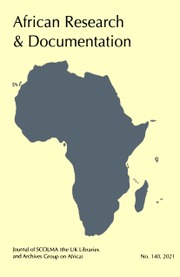Article contents
Dialectical Construction and Deconstruction of Contemporary African Medicine
Published online by Cambridge University Press: 25 April 2022
Extract
African medicine is an important component of the cultural adaptive system. The system has been evolving interminably in response to changing environmental vulnerabilities and health care needs since primordial times. Flexibility of indigenous African ethnomedicine and its associated customs has since time immemorial incorporated new techniques and knowledge. The resulting textual and discourse heritage on African medicine has often depicted its dialectical interrelationship with western biomedicine and other medical systems. The oral and documentary records on the authenticity of African medicine either conceal or condescend to its contributions to overall healthseeking and illness behaviour. Tensions in conceptualisation of African medicine relate to its pragmatic borrowing from non-African medical systems that are compatible with local pluralistic systems and indigenous ontology. The advent of colonial and post-colonial health care paradigms further define the emergence of dialectics in the documentation and appraisal of African medicine against western standards of science and health care practices.
- Type
- Research Article
- Information
- Copyright
- Copyright © International African Institute 2016
Footnotes
The initial version of this paper was presented as the keynote address at the SCOLMA conference, African Medicine Matters: documenting encounters in medical practice and healthcare, held in Cambridge on 6th September 2016
References
References
- 1
- Cited by




